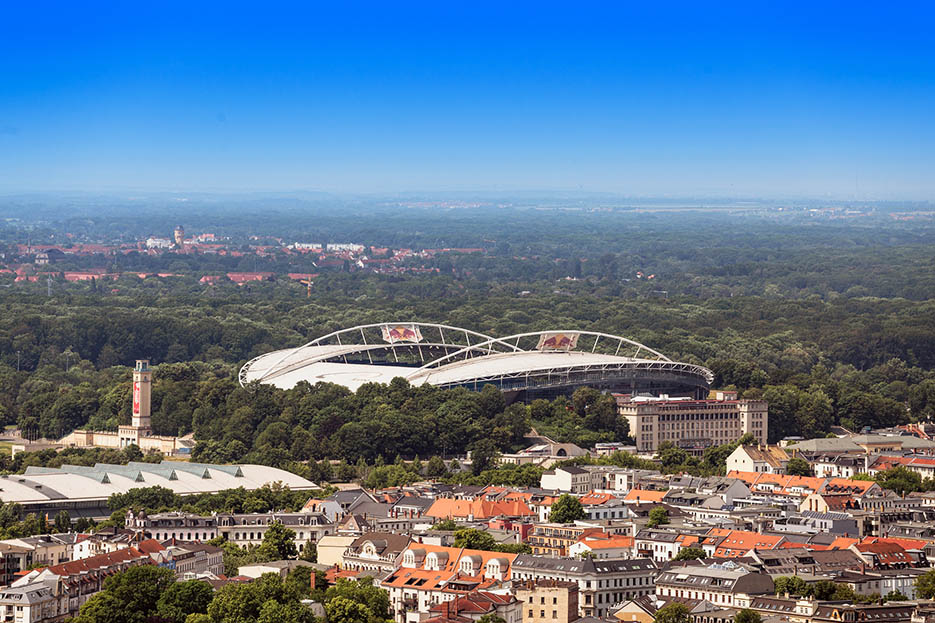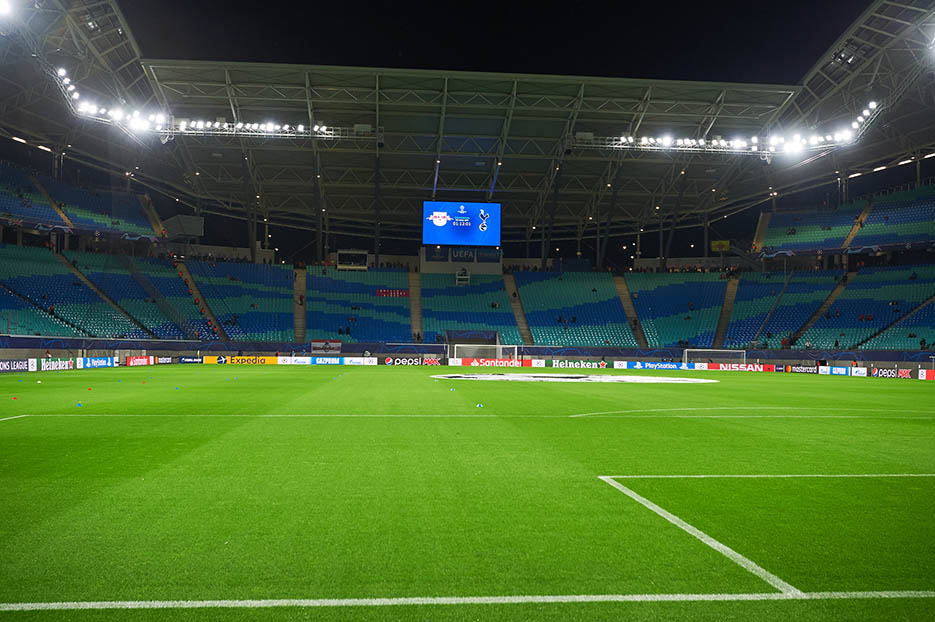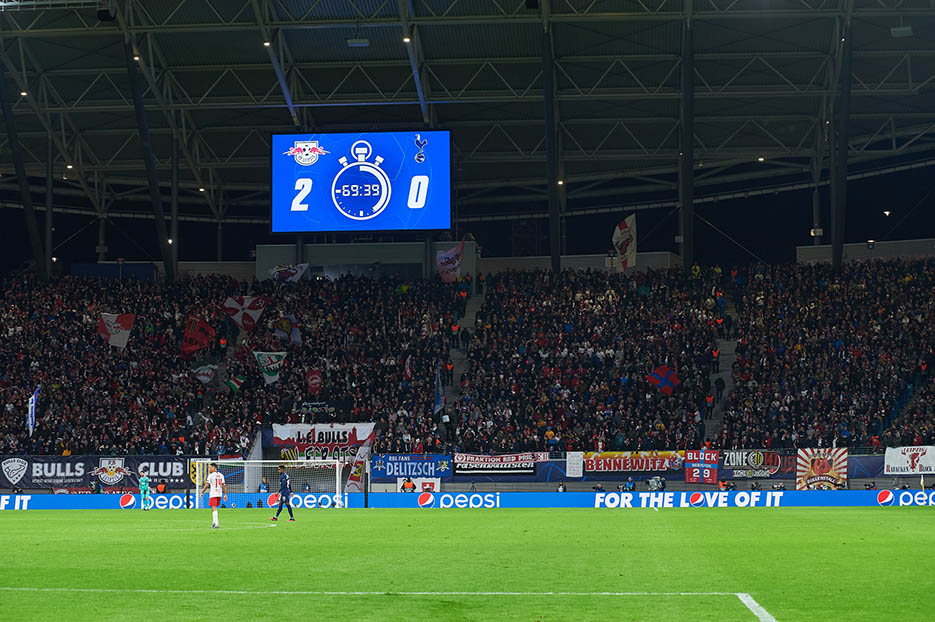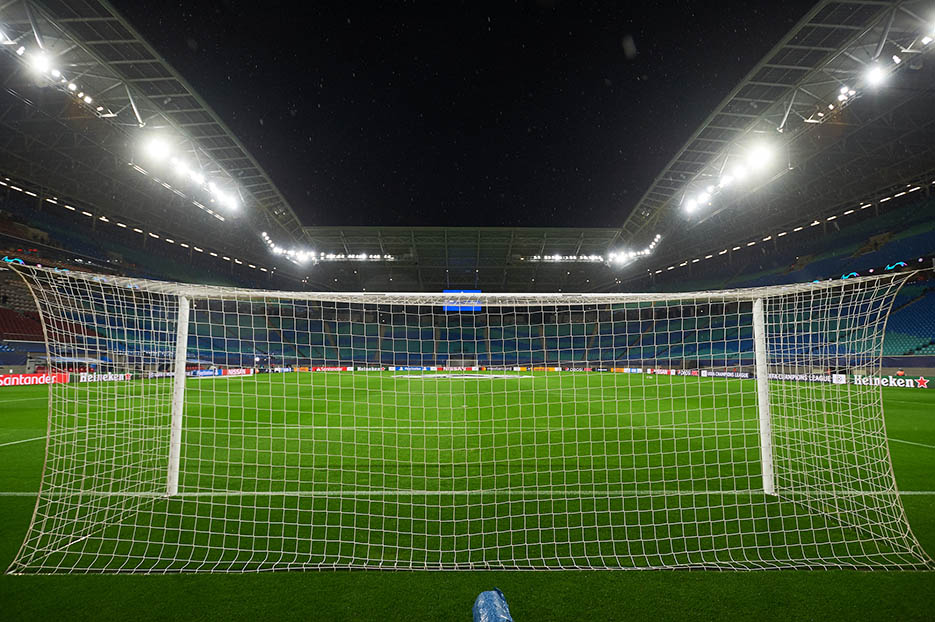Frankfurt Arena Complete Guide - Furnace Too Hot for the City
One of the Bundesliga’s most fiery stadiums will host the 2024 EURO matches - check out all you need to know in this Frankfurt Arena Complete Guide.


There isn't a more controversial club in the world, hence there is no more controversial and hated football stadium in the world. Yet, the hospitality is not the reason for it. Actually, the Leipzig Stadium complete guide will easily convince you the city and the arena are a great place to visit. Just don't mention it to other German fans.
Of course, the Leipzig Stadium is the UEFA name for the Red Bull Arena, home of RB Leipzig. Under the organisation's rules, the stadium can't bear the name of the sponsor for the UEFA competitions, including the Euro 2024 in Germany. Hence the ground will be called Leipzig Stadium in all the protocols.
The city of Leipzig will host four games of football at the Euro 2024!
We can expect the Czech fans to dominate the city's landscape as they are the closest country to the city in east Germany.
The Leipzig Stadium will be a host to two derbies of the Group stage.
Portugal vs Czech Republic (Tuesday, June 18th, 21:00) in Group F
The Netherlands vs France (Friday, June 21st, 21:00) in Group D
Croatia vs Italy (Monday, June 24th, 21:00), in Group B
One game of the knockout stages will be played at the Leipzig Stadium.
1st from Group D vs 2nd from group F (Sunday, July 2nd, 21:00) round of 16
Group D is one the tournament's toughest groups, with France, Netherlands, and Austria waiting for the play-off winner from path A. So it's completely impossible to predict who will play in this knockout match.
This will be the last match of the first knockout round.
Some non-Leipzig fans have scoffed at the words history and Red Bull Arena mentioned in the same sentence. Then again at us for mentioning Leipzig fans.
Why? Well, the German football community has a strong belief in the ownership model governing the clubs by which no person or private entity could own more than half of the club. The famed 50+1 rule states that clubs who don't own the majority of themselves can't compete in the Bundesliga. So that the foreign investors can't control the club.
Which is exactly what happened at the Red Bull Arena with RB Leipzig. If the name wasn't a dead giveaway. This is the reason why the Leipzig club is broadly the most hated and protested club in Germany certainly, but probably in the world.
Many fans of other Bundesliga clubs simply boycott the away games at Leipzig, skipping the Red Bull Arena entirely.
The origin story of RB Leipzig is unfootballing as per German standards, as the Red Bull e energy drink and now football corporation bought a smaller club’s rights, turning SSV Markranstadt into RB Leipzig. However, the stadium isn’t their doing and the ground itself has history behind it.

Known formerly as the Zentralstadion - or the Central Stadium, Leipzig's former biggest ground had a capacity of 120,000 people! Lokomotiva Leipzig used to play at the stadium that was built in 1955 with the plans made by the architect of the Olympiastadion Berlin, Werner March, back before World War II.
Yet, due to the war itself, the plans weren't made to fruition. Only in 1955 did the work commence, with a significant use of volunteers. Back then, Leipzig was a part of the German Democratic Republic, more well-known as East Germany.
About 1.5 million cubic metres of debris from the World War II bombing of Leipzig was used in the stadium's construction.
FC Lokomotive Leipzig was the tenant of the massive arena that was dug into a mound. Which remains to this day.
Contrary to popular belief, the Red Bull corporation didn’t construct the current modern arena.
Actually, the city of Leipzig constructed the stadium for the needs of the 2006 World Cup in Germany! With a cost of €116,000,000!
Hence, five matches of the 2006 World Cup were held at this stadium, four in the groups and one in the knockout stages.
The ground also hosted three matches for the 2005 Confederations Cup, including a third-spot match.
However, the stadium was still called Zentralstadion at the time.
For the first five years since it was rebuilt, the stadium was used by FC Sachsen Leipzig. Since 2010, RB Leipzig has become the primary user of the stadium. Primary, because the German national team played here as well.
Since 2016, the stadium has been owned by the RB Leipzig football club and in 2015 it was renovated.

The similarities with the architecture of the Olympiastadion are visible to this day, even with the new arena. Mostly because of the surrounding area immediately outside the ground.
As in Berlin, there is a massive 215x185 metres field just 130 from the actual stadium walls. Used for festivals, concerts, and the like.
But there are more similarities, most notably the bell tower between the festival ground and the stadium.
Right behind it, the relief gets higher, with the mound of the original Zentralstadion still kept. Within it, is the new arena.
The elevated area is forested and the stadium is just 117 metres away from the Elsterbecken River.
Because of the mound, over 10 bridges serve as entrance points for the getting to the terraces.
Dimensions:
North to South: 230 metres
East to West: 210 metres
Height to Roof: 46.5 metres
Pitch size: 105 x 68 metres
Grass area 120 x 80 metres
The capacity of the Leipzig Stadium is 47,069 fans. But for UEFA competitions, the maximum number of people is 40,000.
The stadium's capacity was expanded in 2021 during the renovations from the initial 44,345 potential viewers.

Besides Berlin, Leipzig is the only Euros 2024 stadium that is located in the eastern part of Germany.
As we said, 100 kilometres away from the Czech Republic border to the south, and 162 kilometres from Poland to the east.
The city lies on the artificially created river basin Elsterbecken. While the whole area is surrounded by many lakes, especially to the south of the city.
Leipzig is the most populous city of the German federal state Saxony, with over 600,000 inhabitants.
The closest major German city to Leipzig is Dresden, some 100 kilometres to the southeast.
Still, the city is only 75 minutes away from Berlin. A city it's becoming to look more and more alike as the booming artist community has grown quickly in Leipzig. So much so, that the young ones are calling their town Hypezig now.
Leipzig/Halle Airport is located 12 kilometres northwest of the Leipzig city centre.
The main train station and the main bus station are located in the actual city centre.
The stadium is less than two kilometres away from the city centre and the are in between looks great for a walk.
While Leipzig has the light rail system, the S-Bahn, none of the lines go near the stadium. However, it makes the transit from the airport to the central train station a 15-minute task.
The city is also well connected with other German cities via the train tracks, with frequent long distance lines being:
Hamburg - Berlin – Leipzig – Frankfurt – Stuttgart – Munich
Hamburg – Berlin – Leipzig – Munich
Dresden – Leipzig – Frankfurt – Wiesbaden
Dresden – Leipzig – Dortmund – Cologne
Leipzig – Stuttgart – Karlsruhe
Popular international train routes include Prague (Czech Republic), Basel and Zurich (Switzerland).
Furthermore, the bus and tram lines are connected to the Sportforum Sud stop just south of the stadium: 1, 2, 3, 4, 7, 8, 10, 11, 12, 15, 16, 54, 56, and N10 tram lines. But also the N1, N2, and N3 bus lines.
The earlier Waldplatz station can also be used as it's not far from the stadium as well.
While the Leipzig, Sportforum Ost to the east of the stadium is a stop for the lines 1, 2, 3, 4, 7, 9, 10, 11, 12, and 14.
No public parking for cars will be available at the stadium during the Euros, even though the ground itself has a large parking place.
Possibly the best way of exploring Leipzig is to get on the 36-story skyscraper known as the City Hochhaus. Because of its observation deck, it can help you familiarise yourself with the place from above.
Luckily, the location is right adjacent to the Augustusplatz Square where the fan zone will be. St. Nicholas Church - the city's main tourist attraction in the centre is just a block away!
While now primarily known for its football club, Leipzig is a historic spot as it's the place where the biggest battle of the Napoleonic wars happened.
Hence, the city has a massive commemoration spot for it. The Monument to the Battle of the Nations is a rare sight as it honours and reminds of the bloody battle which saw half a million men involved and resulted in 100,000 casualties.
Leipzig Panometer is a must-see for art enjoyers, as the unique exhibition space features immersive 360-degree panoramic art up to 32 meters in height.
Leipzig is also known for its Zoo, believed to be one of the best in Germany, and even in the world. With it being just a kilometre away from the city centre.
As the city is laced with a canal, canoeing is an option and can transport you to the Lake Conspuder in the south even!
Hostels range from €25 a night, rental apartments from €75 a night, hotels are a bit cheaper at €65 per night.
If you want to stay as close to the stadium as possible, Zentrum-Nordwest is the best neighbourhood option. While Sudvorstadt is the best option for those looking for trend nightouts. Of course, the city centre is the most reliable and best-connected option.

One of the Bundesliga’s most fiery stadiums will host the 2024 EURO matches - check out all you need to know in this Frankfurt Arena Complete Guide.
The Stuttgart Arena complete guide will maximize your enjoyment for the upcoming Euro 2024, and prepare you with all the interesting and important tidbits.
Arena AufSchalke complete guide will inform you about all you need to know in order to have a fulfilling EURO 2024 experience in Gelsenkirchen.
BVB Stadion Dortmund complete guide will have you geared up and completely ready for the ultimate EURO 2024 experience in one of Germany's best football cities.
Discover everything you need to know about the Munich Football Arena, in order to have the best experience at the Euro 2024 or anytime visiting the Bavarian cap